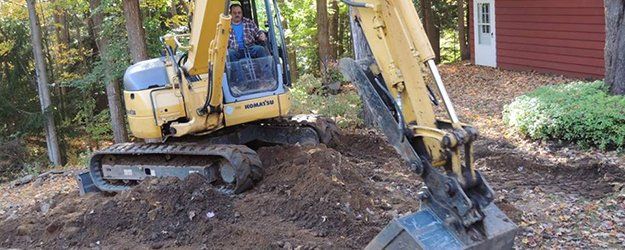Residential Excavating Ohio - Specialized Excavation for Ohio Residences
Residential Excavating Ohio - Specialized Excavation for Ohio Residences
Blog Article
Comprehensive Excavation Methods: Mastering the Basics for Success
In the world of construction and civil engineering, the relevance of reliable excavation strategies can not be overstated. The cautious preparation, specific implementation, and thorough attention to detail required in excavation projects demand a detailed strategy that incorporates various fundamental aspects. From initial soil analysis to the implementation of precaution and regular progress monitoring, mastering these core elements is important for achieving success in any excavation endeavor. However, the true proficiency exists not just in recognizing these principles however in perfectly integrating them to browse the intricacies of excavation projects with skill.
Comprehending Excavation Project Preparation

Effective excavation projects are developed on the structure of careful and thorough preparation. The preliminary stage of any excavation job is the drawing board, where vital choices are made that can considerably affect the end result of the project. During this phase, it is important to collect all pertinent information about the site, consisting of topographical studies, soil structure, and any kind of potential risks that might exist. Recognizing the job timeline, budget plan, and extent restrictions is vital for developing a comprehensive excavation plan that makes sure the job's success.
One secret element of excavation project planning is the growth of an in-depth timeline that outlines the sequence of milestones, due dates, and tasks. By carefully thinking about all these variables during the planning phase, excavation tasks can be performed successfully and effectively, leading to successful results - dump truck companies in ohio.
Dirt Analysis and Site Examination
Performing comprehensive soil analysis and website examination is a crucial step in the preparation phase of any type of excavation job. Dirt evaluation entails establishing the composition, structure, and residential properties of the dirt at the excavation website. This details is critical for recognizing the dirt's bearing ability, dampness web content, and possibility for disintegration, which are vital consider establishing the excavation approaches and tools required for the job.
Site assessment exceeds soil analysis and includes a more comprehensive assessment of the total website conditions. This assessment consists of identifying any potential hazards, such as below ground energies, environmental issues, or unstable surface, that might affect the excavation process. By thoroughly evaluating the website, job managers can create reliable excavation methods that prioritize safety and security, performance, and environmental protection.
Making use of sophisticated innovations like ground-penetrating radar, dirt tasting, and drone surveys can boost the accuracy and efficiency of dirt analysis and website examination. Investing time and sources in these preliminary actions can eventually conserve time and stop costly hold-ups or problems throughout the excavation process.
Equipment Option and Usage
Reliable excavation jobs rely greatly on tactical tools selection and application to guarantee optimal performance and performance. Choosing the right devices for the job is crucial in making the most of performance and lessening downtime. Elements such as the kind of soil, lancaster excavation deepness of excavation, and project range play a significant function in determining one of the most ideal equipment for the job handy.

In addition to choosing the suitable equipment, proper utilization is vital to task success. Operators has to be educated to deal with the equipment safely and successfully - lancaster excavation. Regular upkeep checks and prompt repair services assist prevent breakdowns and make certain regular efficiency throughout the job
Security Measures and Rules Conformity
In the realm of excavation tasks, focusing on safety measures and conformity with policies is paramount to ensuring a legitimately sound and safe and secure functional environment. Precaution encompass a variety of methods, consisting of carrying out comprehensive website evaluations, implementing appropriate signage and obstacles, and providing appropriate safety and security training for all workers involved in the excavation procedure. Adherence to regulations, such as OSHA requirements in the USA, guarantees that the excavation task satisfies the essential standards to shield workers, onlookers, and the surrounding atmosphere.

Monitoring Progression and Adjusting Methods
Exactly how can project supervisors successfully track the development of excavation tasks and adjust their techniques accordingly to maximize results? Monitoring progression is vital for guaranteeing that excavation tasks remain on track and fulfill due dates. Project supervisors can utilize different devices and techniques to track progress, such as daily report card, regular site inspections, and progressed monitoring modern technologies like drones and GPS tracking systems. By continually keeping track of the task's development, supervisors can identify any type of possible delays or problems early on and take positive actions to address them.

Conclusion
Finally, mastering the basics of extensive excavation approaches is necessary for the success of any task. By comprehending task planning, analyzing soil and website conditions, picking suitable tools, following safety and security guidelines, and monitoring development, project managers can make certain a smooth and effective excavation process. Carrying out these strategies will bring about successful results and decrease potential dangers or setbacks during the excavation job.
The first phase of any kind of excavation project is the planning phase, where critical decisions are made that can substantially impact the outcome of the job. Recognizing the project budget plan, timeline, and range restraints is crucial for creating a detailed excavation strategy that makes certain the task's success.
How can project managers efficiently track the improvement of excavation tasks and adjust their methods accordingly to optimize outcomes? By closely keeping track of development and being ready to adapt methods, job managers can boost the total success of excavation tasks.
By recognizing task preparation, examining dirt and site conditions, selecting suitable equipment, complying with safety and security laws, and monitoring progression, task supervisors can guarantee a smooth and effective excavation process.
Report this page